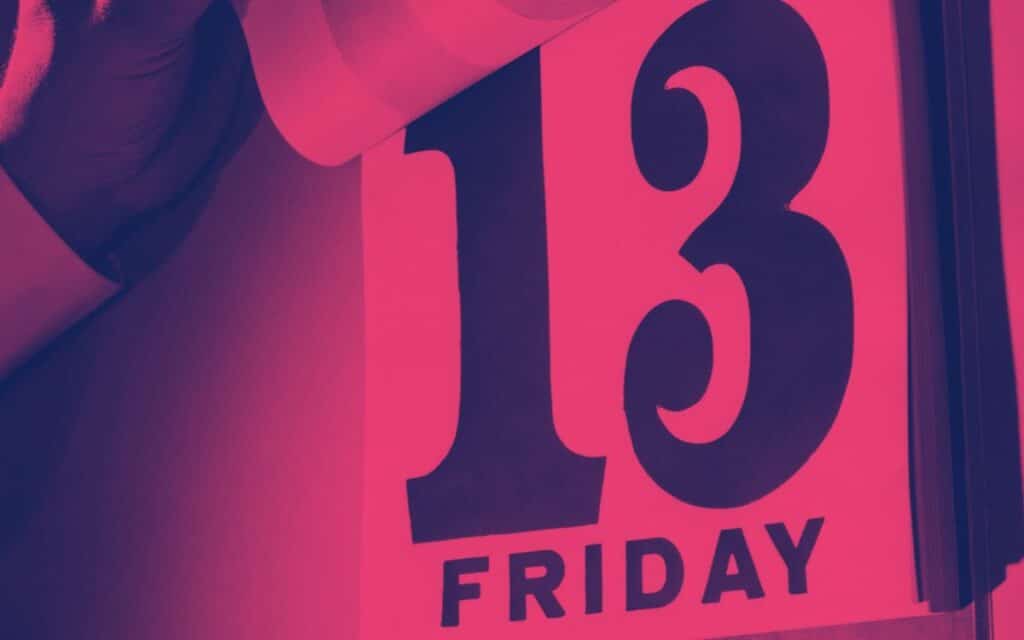Serious stuff or just silly superstition? Grab your lucky horseshoe as PAUL MOYNIHAN takes a look at the origins of Friday the 13th!

For some, it’s just another date on the calendar. A day like any other, with absolutely nothing to differentiate it from the other six days in the week. But for others, it is a day of fear and terror.
No, I’m not talking about the day you forget the wedding anniversary. I’m talking about Friday the 13th.
The origins of this day of doom are hazy to say the least (adding to its mysterious quality), but its effect on society is something of a cultural phenomenon. For decades, numerous people have quivered in fear at the thought of this disastrous day. But why?
Friday the 13th, an unlucky day
It is believed by many that Friday is the unluckiest day of the week because, historically, it has dished out a fair share of bad luck.
It is commonly seen amongst Christians as being the day that Adam took the forbidden fruit from Eve, marking a significant event in the catalogue of man’s weakness.
Christians also believe that Jesus was crucified on Friday (which has come to be known as Good Friday).
The number 13 has proven to be similarly nasty in Christian belief.
It has been linked to a number of fateful events in the Bible, most notably the Last Supper.
Many believe Judas Iscariot was the 13th man to be seated for the meal, and he would go on to betray Jesus, turning him over to Pilate.
Because of this, it is considered unlucky to host a meal for 13.
The Last Supper isn’t the only meal to be associated with this ominous number. In Norse mythology, there is an infamous tale of 12 gods who gathered for dinner in Valhalla.
“It is believed by many that Friday is the unluckiest day of the week because, historically, it has dished out a fair share of bad luck.”
The 13th guest arrived uninvited, and it was the jester-like Loki, known to many as an untrustworthy shape-shifter. Loki asked Hoder, the blind god of darkness, to shoot Balder the Good with a mistletoe-tipped arrow. Balder was killed, and from then on 13 was seen as being an unlucky, treacherous number.
The first recorded evidence of the juxtaposition of ‘Friday’ and ’13’ resulting in bad luck occurred in the biography of Italian composer Gioachino Rossini, written by Henry Sutherland Edwards in 1869. He wrote of Rossini’s belief that Friday was an unlucky day, and 13 an unlucky number. In a spooky twist of fate, Rossini would die on Friday the 13th of November, 1868.
In numerological terms, 13 just seems to sit uneasily next to its neighbour, 12. 12 is seen as a ‘perfect’ number by many, representing the 12 months of the year, the 12 apostles of Jesus, and the 12 signs of the Zodiac. One more number beyond that feels somewhat strange and unbalanced for a lot of people. Many skyscrapers, hotels and hospitals all over the world refuse to have a thirteenth floor, purely because of its association with bad luck.
Clearly, taking Friday and placing the number 13 beside it has become a formula for fear, and a serious issue for millions of people.

The fear of Friday the 13th is a recognised phobia, known as paraskevidekatriaphobia.
It has lead to people simply refusing to leave their beds on the date, and cancelling flights, meetings and simple trips outside their front doors. Like any other phobia, it has the power to instill sheer panic into the hearts of its victims.
But it’s not all bad luck. Take the highly successful Friday The 13th horror movie franchise, for example. The series has grossed almost $500 million at the box office, making it one of the highest grossing series in cinema history.
If anything, this meant a lot of good luck was on the side of the filmmakers. The number 13 is considered to be a wholesome number by the tattoo community, and it is a highly popular piece of body art. It’s all about perspective it seems.
Lucky for some, nightmarish for others, Friday the 13th is a tradition that will probably stay around forever.
Its impact on the social psyche is clearly a huge one, and its ability to unnerve the superstitiously-minded just proves the power of ancient tradition in this technologically-advanced world.
Whatever your views, try to put it at the back of your mind and remember, Friday the 13th is followed by the far more welcoming Saturday the 14th, marking the beginning of the weekend. That can’t be a bad thing!
Check out these Friday the 13th Superstitions in Wales!

